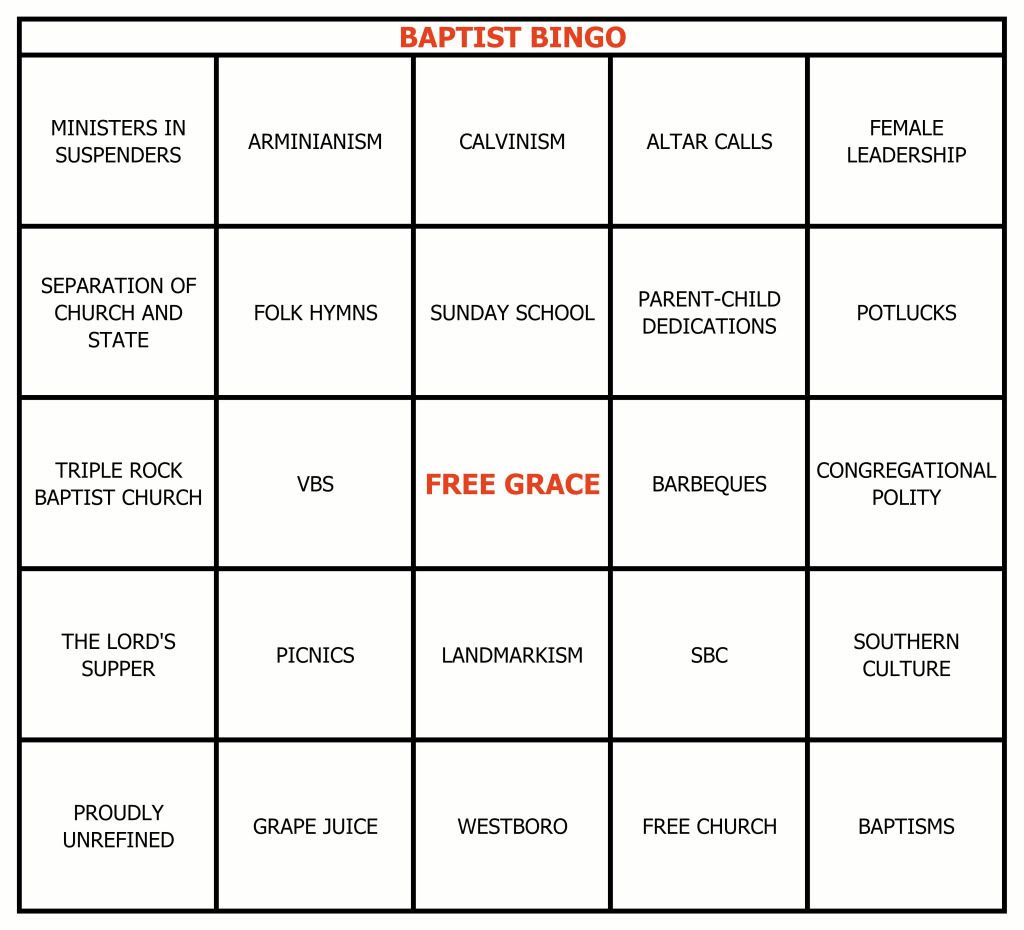Baptists are funny creatures. They are complex and contradictory in all of their forms, and they do take many forms. There are some things that you expect from them, which they usually deliver, and other things that you might expect and be surprised not to find. I’m going to be exploring some of the quirks and stereotypes of Baptists in a feature I call:
BAPTIST BINGO (Ta-da!)
If you are a Baptist, you probably think that I left a lot of critical things out and put in some junk. Too bad; it’s not your blog. If you aren’t a Baptist but will have the opportunity to attend a Baptist service in the future, keep an eye out for the items on the card. If you fill out the whole card, though, I think you may be spending too much time at church. Go watch a football game or something.
“Baptists believe that the Lord’s Supper is symbolic. The bread and fruit of the vine are but symbols of the broken body and spilled blood of Jesus. . . The Lord’s Supper is a repetitive ordinance. It is to be observed as a remembrance of that which the Lord did for our salvation (I Cor. 11:24-26), until he comes again.” -Herschel H. Hobbs, “What Baptists Believe”
This is where my Roman Catholic friends get confused. They don’t know the word “ordinance,” which is the Baptist term for two specific acts instituted by Christ: Baptism and the Lord’s Supper.
“Wait,” they say, “so you don’t think that the Eucharist is a sacrament?”
Well, yes and no. More on the theology of sacraments another day. We do think it works differently than many other denominations think that it works. But the critical thing to take away is that we still put Baptism and the Lord’s Supper at the top. Not viewing them as sacramental in the Catholic way doesn’t make them less important to us than they are to sacramental Christians. If a Roman Catholic had to stack different practices of her church from least to most critical, the seven sacraments would end up on top, fervently defended and regularly practiced. It’s the same for Baptists: our two ordinances are the two practices on top, and just like Catholic martyrs, Baptists have defended our way of practicing them even to the point of death.
Baptists usually observe the Lord’s Supper this way: the congregation remains seated while the minister prays over broken unleavened bread and tiny cups of grape juice. (Yes, unfermented juice. That’s also one for another day.) The bread is passed around and everyone takes a piece, silently praying and meditating with the bread in their hands. The minister makes a declaration along the lines of “The body of Christ, broken for us,” and then the congregation all eats together, at the same moment. This is repeated with the juice.
Baptists aren’t the only Christians who observe the Lord’s Supper this way. When I was a child, I would sit in my nondenominational church with the communion cup cradled in my hands, staring down into the juice as hard as I could. Up at the altar, the prayer was long and dry and filled with ten-dollar words to demonstrate that we had a thorough theological comprehension of the atonement of our sins. I tuned it out. This was the time I shared with Jesus-- the time when I thought about what it means that God once hurt and bled. It was the time when I knew that God understands what it’s like to be lonely and scared and in pain. It was the time I remembered reasons to belong to God other than the fact that God was big and powerful and could get me into Heaven.
The bread was oyster crackers. I always thought they tasted too good for their purpose. Salty and puffy, they would melt away in my watering mouth and remind my stomach that it was lunchtime.
When I was a teenager, Grace switched to using large chunks of broken Saltines which always got jammed inside my dental appliance. I was afraid that I would choke to death on the Lord’s Supper-- possibly the most humiliating way to end up before the Throne of God. It was hard work to get all of the cracker down by the time I was supposed to be swallowing the thimbleful of juice.
My Baptist church practices the Lord's Supper in the same way (although with unsalted, hard crackers that are much less likely to get my gut gurgling.) When the juice comes around, I reach for it eagerly. I sit with my fellow Christians, cradling that cup and staring down into it, all of us making an intensely private moment into a shared public one. This physical act drags me back to the place where I’m supposed to start my life, and end my life, and live every day in between.
By the time the first Sunday of the month rolls around, I’m usually antsy again for communion again. But sometimes it takes me by surprise. Today was one of those days. I sat there with the cup cradled in my hands and thought, “What am I supposed to do with this?”
Sometimes it's good to forget what we know about something and go in cold. I looked down at that goofy little cup and saw the blood of a god on my hands, and it was unexpected and shocking. There is guilt in the Lord’s Supper. I looked down and saw grace in my hands, and thought, “I need more of this. This tiny cup isn’t enough.” Like Peter said: Lord, not only my feet, but my head and hands as well. Give me all of the grace and forgiveness that God has to offer. Love is poured out in the Lord’s Supper.

No comments:
Post a Comment